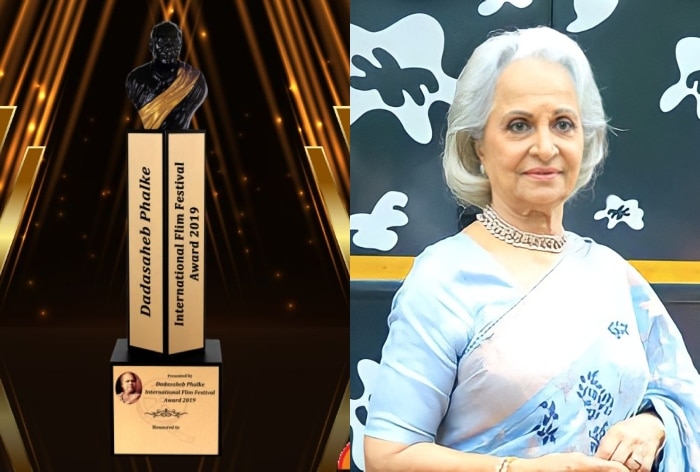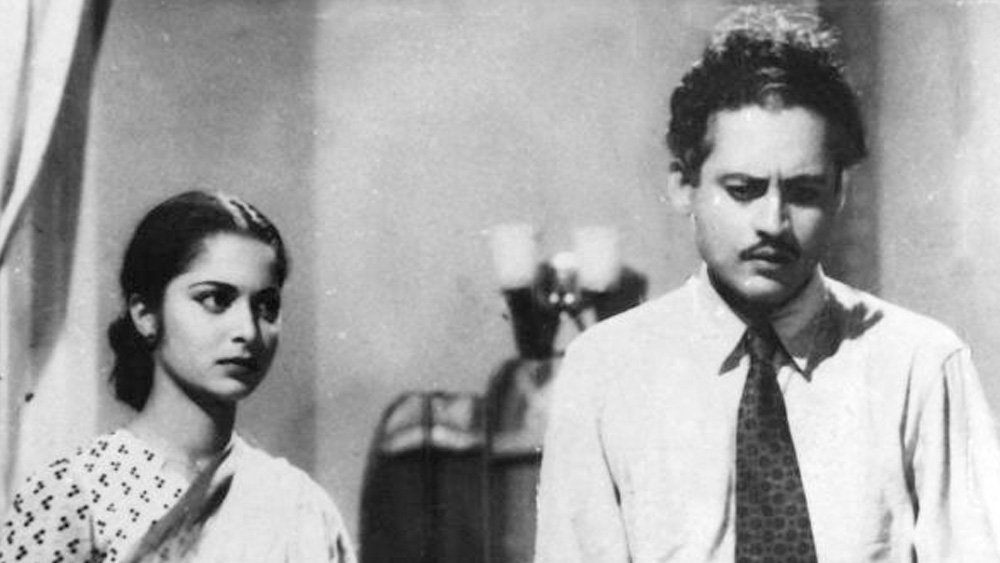From ‘Pyaasa’ to ‘Trishul’: Waheeda Rehman’s Journey to the Dadasaheb Phalke Lifetime Achievement Award
Renowned actress Waheeda Rehman will be honored with the prestigious Dadasaheb Phalke Lifetime Achievement Award, the highest honor in Indian cinema. This news was announced by Union Minister for Information and Broadcasting, Anurag Thakur, on September 26.
Waheeda Rehman is considered one of India’s finest actors and is well-known for her outstanding performances in movies like “Pyaasa,” “CID,” “Guide,” “Kaagaz Ke Phool,” “Khamoshi,” and “Trishul.”
The minister expressed his happiness and honor in announcing this award for Waheeda Rehman, recognizing her remarkable contributions to Indian cinema. He also mentioned the recent passage of the Women’s Reservation Bill in Parliament. He highlighted that this award is a fitting tribute to her, as she has excelled in films and dedicated herself to philanthropy and the betterment of society.

Thakur congratulated the 85-year-old veteran actress and praised her significant work that has left an indelible mark on Indian film history.
Waheeda Rehman’s career highlights include her debut in Telugu films in 1955 and her entry into Hindi cinema with the movie “CID” in 1956. She has appeared in over 90 films in various languages during her five-decade-long career. Additionally, she has received the National Film Award for her role in “Reshma and Shera” (1971) and has been honored with the Padma Shri and Padma Bhushan awards.
From Humble Beginnings to Bollywood Icon
Waheeda Rehman is a legendary Indian actress known for her exceptional talent and contributions to Indian cinema. Her journey from a humble childhood to becoming one of the most celebrated actresses in the film industry is truly inspiring.
Childhood and Early Life:
Waheeda Rehman was born on February 3, 1938, in Chengalpattu, Tamil Nadu, India. She was born into a conservative Muslim family. Her father, Mohammed Abdur Rehman, was a district commissioner, which meant the family had to relocate frequently due to his job. Waheeda grew up in various parts of Tamil Nadu, including Chennai.
Despite the challenges of frequent relocations, Waheeda had a passion for dance from a young age. Her love for the art form led her to take dance lessons, and she soon became a proficient dancer.
Career in Indian Cinema:

Waheeda Rehman’s entry into the world of cinema happened almost by chance. She was spotted by a film director while performing in a school play, and this encounter eventually led to her debut in Telugu cinema with the films “Rojulu Marayi” and “Jayasimha” in 1955.
Her Hindi cinema debut came in 1956 with the film “CID,” starring opposite the iconic Dev Anand. This marked the beginning of a remarkable career in Bollywood. Waheeda Rehman quickly gained recognition for her acting prowess and screen presence.
She went on to deliver outstanding performances in a wide range of films, including memorable roles in “Pyaasa” (1957), “Guide” (1965), “Kaagaz Ke Phool” (1959), “Khamoshi” (1969), “Trishul” (1978), and many others. Her ability to portray complex characters with depth and authenticity set her apart as one of India’s finest actresses.
ALSO READ: Exploring the National Film Awards: Celebrating Excellence in Indian Cinema
Inspiring Journey:
Waheeda Rehman’s journey is inspiring for several reasons:
Versatility: She displayed incredible versatility, successfully transitioning from romantic lead roles to more unconventional and challenging characters. Her ability to adapt to various genres and portray emotions made her an iconic figure in Indian cinema.
Cultural Impact: Waheeda Rehman’s contributions to Indian cinema have left a lasting cultural impact. Her films continue to be celebrated and admired by generations of moviegoers.
Recognition: She received numerous awards and honors throughout her career, including the National Film Award for her role in “Reshma and Shera” (1971). She was also honored with the Padma Shri and Padma Bhushan awards by the Indian government.
Legacy: Waheeda Rehman’s legacy endures even after retiring from active acting. Her work continues to inspire aspiring actors and filmmakers in India and around the world.
Waheeda Rehman’s journey from a small town in Tamil Nadu to becoming an iconic figure in Indian cinema is a testament to talent, determination, and the ability to break barriers in the entertainment world. Her contributions to the film industry have made her a beloved and respected figure in Indian cinema history.
Dadasaheb Phalke Award History Origins and Significance in Indian Cinema

The Dadasaheb Phalke Lifetime Achievement Award is among the most prestigious and revered honors in the Indian film industry. Named after Dhundiraj Govind Phalke, who is often regarded as the “Father of Indian Cinema,” the award is presented annually to individuals who have made exceptional and enduring contributions to Indian cinema throughout their careers. Here’s a detailed explanation of the award:
1. Origin and Significance:
The Dadasaheb Phalke Lifetime Achievement Award was instituted by the Government of India in 1969 to commemorate the birth anniversary of Dadasaheb Phalke.
Dadasaheb Phalke is known for making India’s first full-length feature film, “Raja Harishchandra,” in 1913. He is widely recognized as a pioneer in Indian cinema.
2. Criteria for Selection:
The award is given to individuals who have consistently demonstrated outstanding excellence in filmmaking, including acting, direction, production, writing, music composition, and other significant contributions to the Indian film industry.
Recipients are typically those who have made a substantial and lasting impact on Indian cinema and have significantly enriched the art and culture of filmmaking in India.
3. Award Presentation:
The Dadasaheb Phalke Lifetime Achievement Award is presented annually during the National Film Awards ceremony, organized by the Directorate of Film Festivals, a Ministry of Information and Broadcasting division.
The National Film Awards are considered India’s most prestigious film awards, and the Dadasaheb Phalke Award is the highest honor in this ceremony.
4. Notable Recipients:
Over the years, the award has been presented to some of the most iconic and influential figures in Indian cinema. Recipients include actors, directors, producers, lyricists, and other luminaries.
The award recognizes their artistic contributions and their impact on the industry.
5. Recognition and Legacy:
Receiving the Dadasaheb Phalke Lifetime Achievement Award is a significant honor and is considered a crowning achievement in the career of a filmmaker or artist.
It acknowledges their lifetime of dedication, creativity, and cultural significance in Indian cinema.
6. Contribution to Indian Cinema:
Recipients of this award are celebrated for their artistic vision, storytelling abilities, and role in shaping the Indian film industry.
Their work often reflects the rich diversity of Indian cinema, encompassing various regional languages, genres, and themes.
In summary, the Dadasaheb Phalke Lifetime Achievement Award is a prestigious recognition that pays tribute to individuals who have left an indelible mark on Indian cinema through their exceptional contributions and dedication. It honors their artistic achievements and their role in preserving and advancing the cultural heritage of Indian filmmaking.
Notable Dadasaheb Phalke Lifetime Achievement Awardees
The first Dadasaheb Phalke Lifetime Achievement Award was presented in 1969. Here are some of the notable recipients of this prestigious award who have won multiple awards over their illustrious careers:
- Devika Rani: Devika Rani, often called the “First Lady of Indian Cinema,” was one of the earliest recipients of the Dadasaheb Phalke Lifetime Achievement Award. She received the award in 1969. Devika Rani was an accomplished actress and producer who played a pivotal role in the early years of Indian cinema. Her contributions to the film industry were immense.
- Prithviraj Kapoor: The renowned actor and founder of the Prithvi Theatre, Prithviraj Kapoor, was honored with the Dadasaheb Phalke Lifetime Achievement Award in 1971. He was a highly respected figure in Indian theater and cinema and is known for his impactful performances in Hindi and English films.
- B. R. Chopra: The distinguished filmmaker and producer B. R. Chopra was recognized with the Dadasaheb Phalke Lifetime Achievement Award in 1998. He is celebrated for his contributions to Indian cinema and his work on iconic films and television series, including “Mahabharat.”
- Yash Chopra: Yash Chopra, one of India’s most renowned film directors and producers, received the Dadasaheb Phalke Lifetime Achievement Award in 2005. He was known for his contributions to the Indian film industry and for directing classic films like “Deewar,” “Silsila,” and “Dilwale Dulhania Le Jayenge.”
- Asha Bhonsle: The legendary playback singer Asha Bhonsle was honored with the Dadasaheb Phalke Lifetime Achievement Award in 2000. She is known for her exceptional singing career spanning several decades and her versatility in singing across various Indian languages.
These are just a few examples of the distinguished artists and filmmakers who have received the Dadasaheb Phalke Lifetime Achievement Award for their remarkable contributions to Indian cinema. The award continues to be presented to individuals who have made enduring and significant impacts on the film industry in India.
We’ve created this content for informational purposes only, and it reflects the views of its respective authors/entities (freelancers/interns) and not those of Winspire Magazine. Winspire Magazine does not endorse or vouch for the accuracy of the information provided in this content. It is the reader’s responsibility to verify and ensure the information is correct and up-to-date. Winspire Magazine disclaims any liability or responsibility for any damages or losses from using this content. Therefore, readers should take all necessary steps to verify the accuracy and reliability of any information presented in this content.


